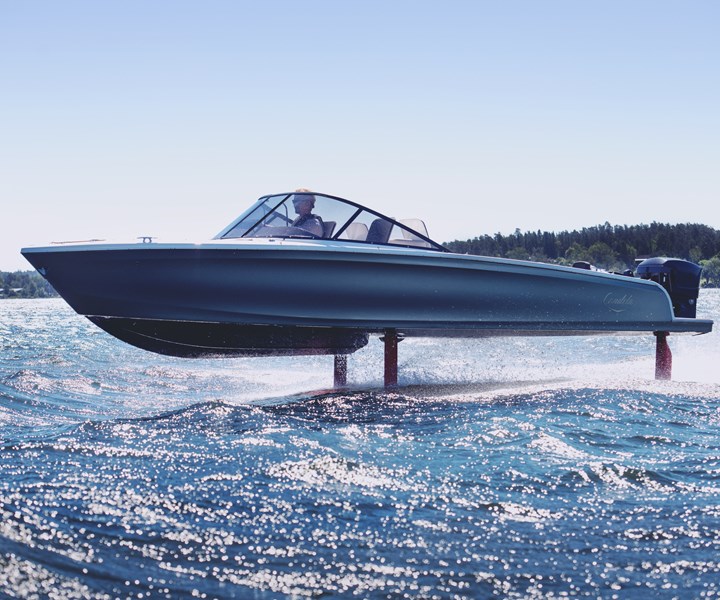Sicomin’s epoxy resins and adhesives enable all-electric foiling boat
The company’s epoxy infusion resins and adhesive products have been qualified for the series production of the Candela Seven all-electric foiling boat.

Sicomin’s epoxy infusion resins and adhesive products have been qualified for the series production of the Candela Seven all-electric foiling boat. Source | Sicomin
Sicomin (Châteauneuf les Martigues, France), formulator and supplier of epoxy resin systems and high-performance composite solutions has announced the qualification of its epoxy infusion resins and adhesive products for the series production of Candela’s new all-electric foiling boat.
Crafted in Sweden, the Candela Seven is a 7.7-meter open motorboat that combines carbon fiber construction and hydrofoils to create a near-silent 100% electric craft with a range of 50 nautical miles (at 25 knots) on a single charge. With a wet weight of only 1300 kilograms, the Candela is reported to be around 45-50% lighter than a traditional glass fiber fossil fuel-powered boat.
Composite engineering work by Candela’s design and engineering team delivered a fully foiling carbon fiber hull and deck structure capable of supporting the 230-kilogram battery pack while only weighing 240 kilograms itself.
Sicomin has been involved with the project since the early stages, working with Candela to supply high-performance epoxy laminating resins for the manufacture of the initial prototype vessels. With the ramp-up of series production, the company has also been able to support Candela’s targets to industrialize the production process, providing materials and process support that are then validated with extensive on-the-water testing.
Candela used Sicomin’s SR1710 as the epoxy system for the boat’s hull and deck. The technology produces laminates with high mechanical properties and a Tg of 100˚C after post cure. SR1710 has also been shown to deliver good performance in hot and wet conditions, critical for a highly loaded foiling craft.
Sicomin’s Isobond SR7100TH epoxy adhesive is used for bonding of the Candela Seven’s internal structures and final assembly of the finished craft. Formulated for both thick and thin bond lines, SR7100TH comes with several different hardener speeds and is resistant to micro-cracking in long term fatigue testing.
In common with other key marine sector focused products in the Sicomin range, both SR1710 and Isobond SR7100TH carry DNV-GL Type Approval providing a reassuring 3rd party confirmation of the products’ exceptional quality, performance and consistency.
The Candela Seven is currently in series production and deliveries have begun in Europe.
Related Content
-
CompoTech uses integrated loop technology to create high-performance mountain bike
CompoTech features its CDuro Epona mountain bike fitted with custom suspension forks, manufactured using its AFL winding and integrated loop technologies.
-
JCB Aero aircraft interior flooring panels incorporate SHD composites
High-performance carbon fiber prepreg using SHD’s FRVC411 epoxy resin system resulted in a durable, compliant design for the MRO market.
-
TU Munich develops cuboidal conformable tanks using carbon fiber composites for increased hydrogen storage
Flat tank enabling standard platform for BEV and FCEV uses thermoplastic and thermoset composites, overwrapped skeleton design in pursuit of 25% more H2 storage.
















